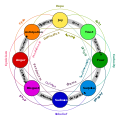This article needs additional citations for verification .(August 2014) |
| Part of a series on |
| Emotions |
|---|
  |
Self-pity is an emotion in which one feels self-centered sorrow and pity toward the self regarding one's own internal and external experiences of suffering. [1] Self-pity has also been defined as an emotion "directed towards others with the goal of attracting attention, empathy, or help" [1] [2]